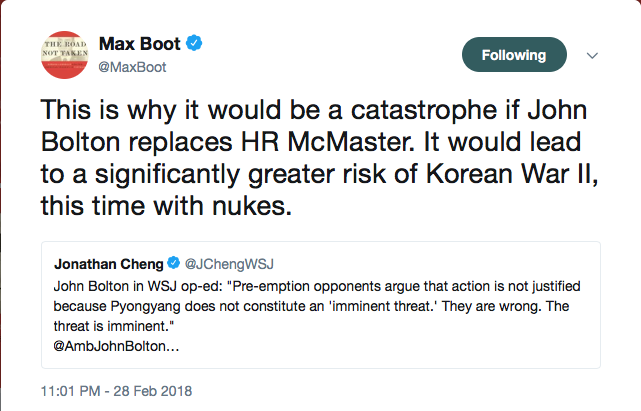After months of rumors, President Trump finally fired Secretary of State Rex Tillerson on Tuesday, and now it seems that rumors of another leading national security official’s demise are coming to fruition. According to the Washington Post, Trump plans to fire National Security Advisor H.R. McMaster. If true, the story raises important questions about the lieutenant general’s legacy and his replacement.
McMaster won acclaim for his book, based on his PhD dissertation, Dereliction of Duty. In it, McMaster argues that Joint Chiefs of Staff cravenly acquiesced to President Lyndon Johnson’s Vietnam policy despite knowing the strategy was doomed from the start. Many observers—as well as admirers—could not ignore the irony as it seemed that McMaster was cravenly acquiescing to Trump.
In a prescient reconsideration of Dereliction, written for War on the Rocks after McMaster was tapped for his current post, Kori Schake noted a healthy dose of political naiveté in it. As Schake wrote at the time:
Reading Dereliction of Duty, I was struck at the extent to which McMaster tries to leach the politics out of policy. It is a common attitude among military strategists since the Napoleonic Wars, as Lawrence Freedman’s fine book on strategy makes clear. But not only does militarized strategy very often fail to achieve the political objectives of war, it is not the American way of war. McMaster is witheringly critical that Johnson considered his top political priorities domestic — that getting Great Society legislation passed mattered more to him than the squandering of lives in a failing war. But every American president makes tradeoffs among competing priorities in determining how much blood and treasure to apportion to war — Lincoln did, Roosevelt did, Bush did, Obama did.
[…]
Dereliction of Duty is an earnest book written from the perspective of someone inexperienced judging the compromises of their elders. I eagerly await the book H.R. McMaster writes after having lived the experience he critiqued as a scholar. In his condemnation of the Vietnam era military leaders, he has set an exacting standard that as national security advisor he will also be judged by. I hope he will not end up the Samantha Power of this administration — someone who wrote a clear-eyed, condemnatory account of moral and strategic failings that was then condemned to enact the same mistakes as a policymaker. McMaster is surely able enough to bring the processes of interagency coordination and policy evaluation into alignment for the Trump administration. The question is whether good processes can trump the political demands and personality of the commander in chief.
The Post story suggests two potential replacements for McMaster. One, Keith Kellogg is a retired general who served on Trump’s transition team, served as acting national security advisor after Mike Flynn was fired, and is apparently someone the president enjoys spending time with personally.
The other, is John Bolton.
Bolton is the type of hawk that makes other hawks nervous.
While McMaster has rightly come under criticism for his reported advocacy of a preventive strike on North Korea, he is not someone who seems to revel in his own hawkishness—believing that military force is the solution to all the country’s foreign policy problems. The same cannot be said for Bolton. As the Trump administration tries to manage the slow-motion crisis over North Korea’s nuclear program, prepare for potential talks with the Kim regime, and decide the future of the Iran nuclear deal—if McMaster is really out as national security advisor—John Bolton is the last person anybody should want overseeing the national security process.
